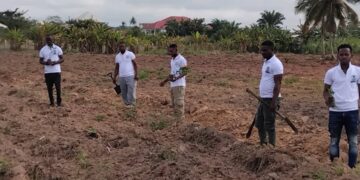In the heart of West Africa, Ghana’s fertile lands hold immense promise for agricultural transformation. Amidst growing concerns about food security, climate change, and youth unemployment, one Organisation stands out in its mission to green the future of Ghana’s farmlands. The Green Fortland Foundation is making waves with a bold and uplifting message: “Yes, we can.” According to George Afful, who is a Senior field technician of Green Fortland Foundation, Ghana has long been recognised for its agricultural potential. With vast arable lands, a favourable climate, and a strong tradition of farming, the nation has all the ingredients necessary for a thriving agricultural sector. However, it is interesting that the country still struggles with challenges such as outdated farming methods, land degradation, lack of access to technology, and limited financing, which have held back the industry’s full potential. The Green Fortland Foundation believes these barriers can be overcome with innovation, education, and community engagement.
A presentation by Mr. Adamu Seidu, the project community liaison officer, highlighted that GFF was established to promote environmental sustainability and agriculture, and environmental conservation cannot be left out. The Green Fortland Foundation operates under a vision of eco-friendly, non-profit, and inclusive stakeholder engagement. In this vein, the Organisation is committed to empowering local farmers, especially youth and women, through training programs, resource support, and awareness campaigns in the towns and villages along the coastal belt of the country.
Mr. John Koomson reiterated that, “The future of Ghana lies in the soil beneath our feet. With the right tools, mindset, and support, farming can be both a livelihood and a solution to many of our pressing challenges.” He said this project shall incorporate Green Youth Farms Initiative, Community Agroforestry Campaigns and smart farming advocacy within the communities selected and beyond. We wish to train the youngsters in organic farming, irrigation techniques, agribusiness, and sustainable land use. By linking agriculture to entrepreneurship, it shifts perceptions of farming from a low-income job to a viable career. Finally, Faustina Opoku, who is the lead administrator of the NGO, assures that the foundation is willing to partner with the rural communities to plant trees, introduce mixed cropping systems, and restore degraded lands. Speaking at the durbar, she said, aside from boosting crop yields, the motivation is to improve biodiversity and combat climate change.
The slogan “Yes, we can” is more than a motivational phrase for Green Fortland—it’s a call to action. It reflects a belief that Ghanaians can reclaim the power of their land and lead Africa in sustainable food production. In the words of Dr. Ebenezer Yiwo, the foundation’s director, “We say ‘yes, we can’ because we see the possibility of a greener, self-reliant Ghana. We believe in farmers, the youth and the fact that farming is the key to Ghana’s national development.” If we master determination, common community spirit, and the guiding belief that “Yes, we can,” the future of farming in Ghana looks brighter than ever.




















